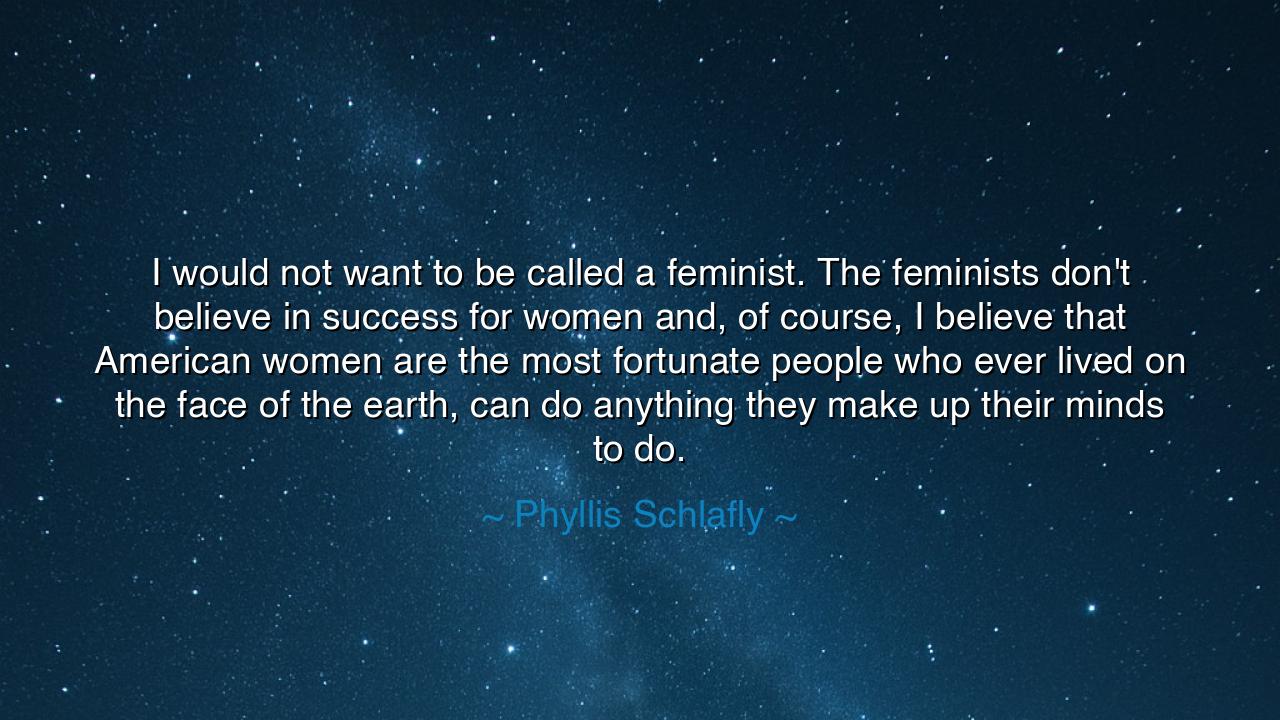
I would not want to be called a feminist. The feminists don't
I would not want to be called a feminist. The feminists don't believe in success for women and, of course, I believe that American women are the most fortunate people who ever lived on the face of the earth, can do anything they make up their minds to do.






Hear the voice of Phyllis Schlafly, who declared with conviction: “I would not want to be called a feminist. The feminists don’t believe in success for women and, of course, I believe that American women are the most fortunate people who ever lived on the face of the earth, can do anything they make up their minds to do.” These words, forged in the heat of America’s cultural debates, strike with force and controversy. They remind us that the struggle over the meaning of womanhood, of success, and of freedom is not one of a single vision, but of many voices, each crying out with its own fire.
The ancients, too, wrestled with the place of women in society. In Greece, women were confined to the household, denied voice in the affairs of the city. Yet in Sparta, women commanded respect, land, and the right to speak, for the Spartans believed that the strength of mothers forged the strength of warriors. Thus from the beginning, civilizations differed on how to understand the power of women. Schlafly’s words belong to this eternal conversation, insisting that the women of her land were already endowed with extraordinary fortune, already capable of greatness without the banner of feminism.
Consider the story of Abigail Adams, wife of America’s second president. She wrote to her husband in 1776, urging him to “remember the ladies” when shaping the laws of the new republic. Though her plea was not fully heeded, it showed that even in the earliest days of the nation, women sought recognition of their worth and their ability. Schlafly’s words, centuries later, echo with a different tone: she believed recognition had already been given, that American women were living in an age of opportunity unmatched in history, limited only by their will to act.
Yet her rejection of the title feminist was also a mark of conflict. For many, feminism meant the struggle for equality, for workplace rights, for the ability to break beyond traditional roles. For Schlafly, feminism had come to symbolize bitterness, resentment, and a denial of women’s achievements. She argued that true empowerment was not found in rejecting family or tradition, but in embracing the abundance of choices already available. In her eyes, women needed not to be liberated by ideology—they were already free by circumstance, and their success lay in determination, not agitation.
This teaching, though controversial, carries a spark of wisdom: that empowerment without gratitude may feel hollow, and that freedom without effort cannot bear fruit. Schlafly’s celebration of American women as “the most fortunate people who ever lived” was not only a political statement—it was a call to recognize the blessings of the age, the doors already open, the possibilities already waiting to be seized. It was a challenge to act with courage, to claim success not as something granted, but as something achieved.
To you who hear these words, whether you agree or resist, let the lesson be this: the path to success demands not only advocacy, but perseverance. Whether one waves the banner of feminism or not, the truth remains that determination is the key to achievement. A woman—or any person—who makes up her mind to rise, to labor, to endure, may indeed accomplish wonders. History is full of such figures, from Florence Nightingale building modern nursing in the midst of war, to Madam C.J. Walker rising from poverty to become America’s first female self-made millionaire. Their lives prove that conviction and effort transform possibility into reality.
Practical wisdom follows: do not wait for the world to bestow its favor. Do not measure yourself solely by labels or movements. Instead, set your mind to your goal, and pursue it with strength. Recognize the opportunities that surround you, and seize them with gratitude and boldness. In this way, whether called feminist or not, whether praised or opposed, you will walk the path of success and leave a legacy for those who come after.
Thus, remember Schlafly’s words: American women can do anything they make up their minds to do. Let this be not a slogan of division, but a reminder of potential. The freedom to act is nothing without the will to act. And so, live boldly, seize your destiny, and let your life be proof that conviction, more than any title, is the true key to greatness.






AAdministratorAdministrator
Welcome, honored guests. Please leave a comment, we will respond soon